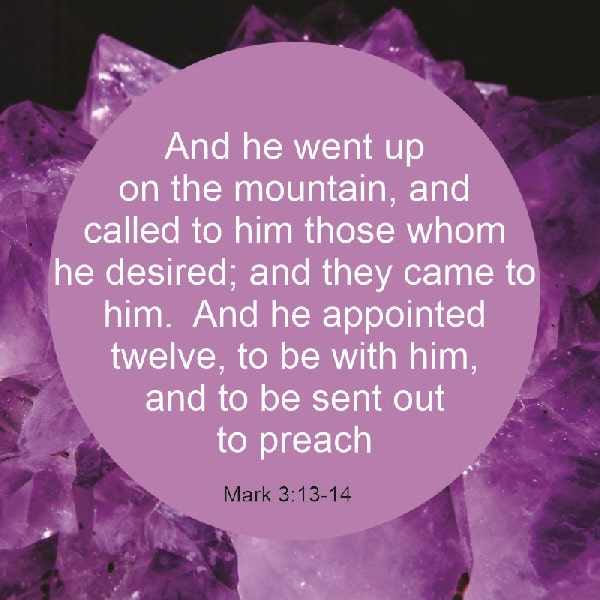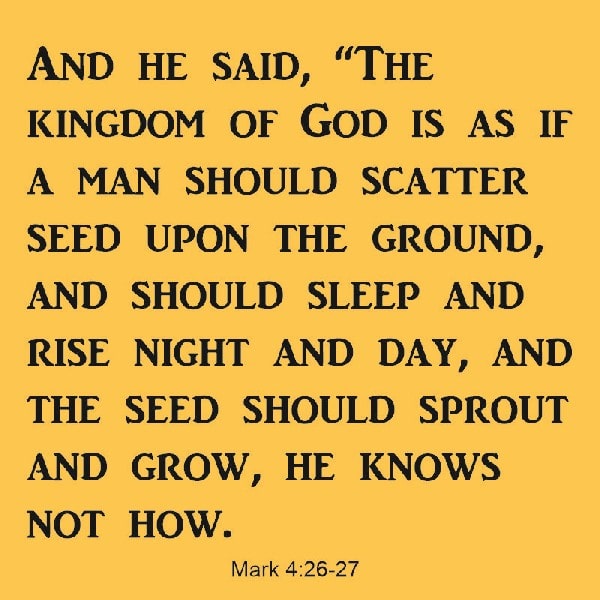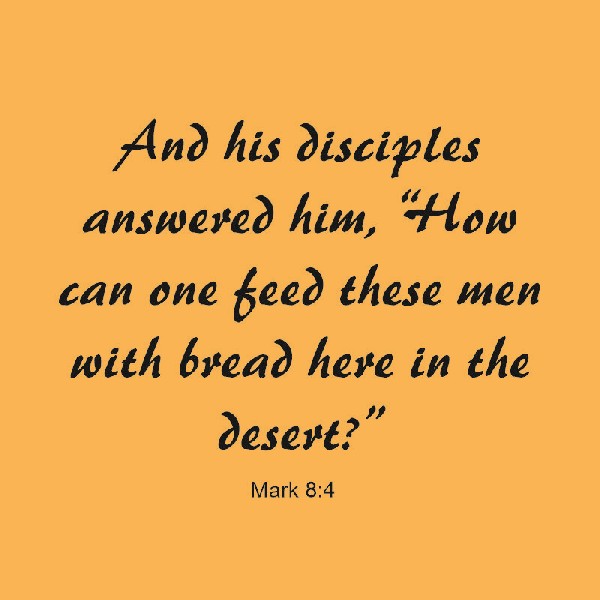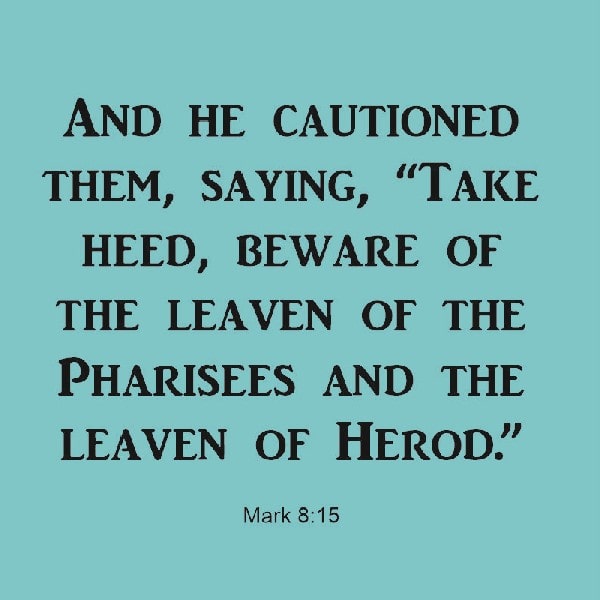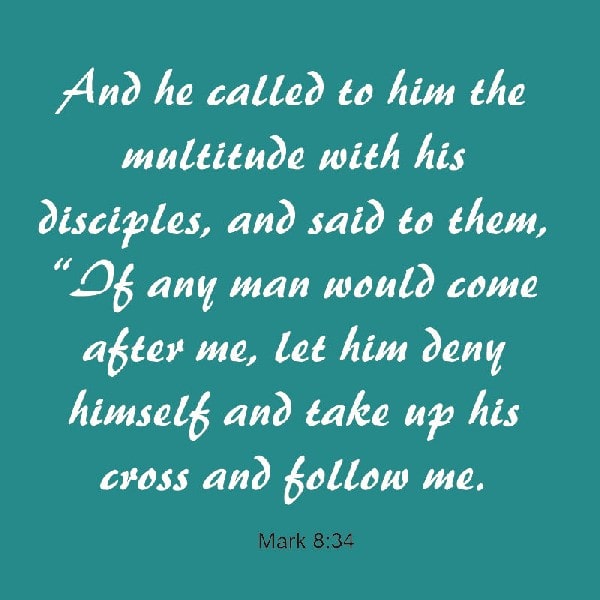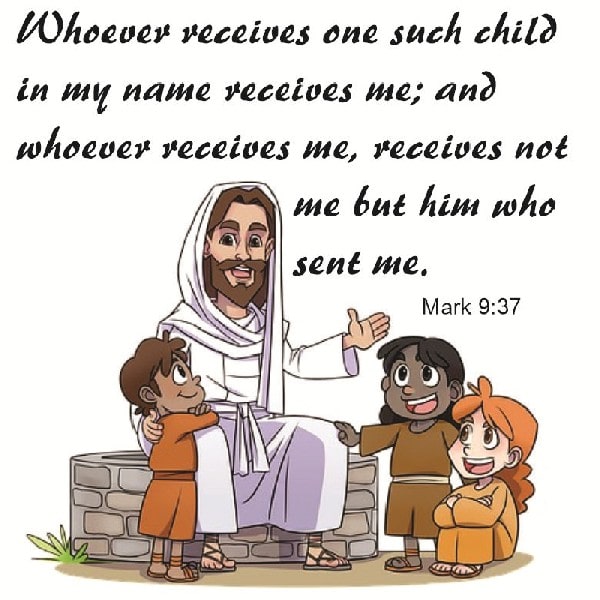Bible study Daily, explanation and encouragement - Mark
When Jesus said, Come after me, He was calling for busy and courageous men. Accustomed to the dangers of the unpredictable sea, and acquainted with patience - the requisite of fishermen - they would have the qualities necessary to be fishers of men. They still had to learn, as the words make clear: I will make you. Christ calls us, not for what we are but for what He is able to make us become.
Despite the exhausting demands of the previous day's preaching and healing activities, Jesus sought to refresh His spirit very early on through prayer.
He prayed many times of course, as Luke records. Is not the phrase scary, "If Jesus needed to pray, how much more should we?"
Certainly prayer was important to Jesus; if it was not, He would have stayed in bed to rest! Prayer is vital and powerful, but it needs to be kept simply in our lives.
Verse 41 - Filled with compassion, Jesus reached out and touched him. "I do," he replied. "Be healed and stay clean!" Instantly, the leprosy disappeared and the man was healed.
MOVED WITH GREAT COMPASSION - Jesus stretched out his hand and, risking ceremonial contamination, touched the man who was not to be touched. Jesus often touched those He healed and was touched by those who sought healing. The Master had the ability and, at the same time, the will to heal the leper, and said: I want, be clean! The inexpressible compassion of Him who can "sympathize with our weaknesses" (Heb 4:15) could hardly be more movingly described.
The leper's purification was instantaneous and complete: soon the leprosy disappeared. Jesus' word, be thou clean, was similar to the expression used by the priests and could be a sign of His priesthood.
Do not be afraid to approach Jesus, no matter your illness whether it is physical or spiritual, He is kind, gentle, polite, understanding... He will understand you and help you... be sincere, ask Him for what you need... and He will respond to you.
Four men brought a paralyzed man into the crowded house, in the faith that Jesus could heal him. Climbing the outer stairs to the roof of that one-story house, the men removed a part from the roof, and lowered the bed. Their cooperation and hard work had paved the way. How happy this paralytic has friends like that! People who pay the price roll up their sleeves to bring a friend to Jesus. Have friends like that. May they bring you closer to Jesus. And not friends who lead you to destruction and after you are suffering they just abandon you and say: "I did not force you, you went because you wanted to".
Seeing their faith - evidenced by what they had done - Jesus announced, with affection to the sick man: SON, YOUR SINS ARE FORGIVEN. It is not known whether the illness of this man had a sinful cause.
Then Jesus went on to prove the validity of His words of forgiveness by the power of His words of healing. Thus, all present would know that the Son of Man has power on earth to forgive sins. The paralytic was ordered to get up, take up his bed and go home without help.
YES. FAITH WORKS.
Jesus was eager to help sinners, but He was never soft on sin. The implication of the question asked by the scribes and Pharisees was unfounded. When a man started to follow Jesus, he had repented from sin. Jesus related to publicans and sinners because he felt the need for them.
Jesus, having heard the criticism, responded with a statement full of irony. He had not come to heal the healthy, nor to call the righteous. These poor, blind Pharisees, whose name was truly a symbol of tenacious loyalty to Judaism, were content with their own condition, confident that they were neither among the sick nor among the sinners. However, the hated publicans and the rejected sinners, fully aware of their needs, welcomed the Physician who did not fear their debasement. In fact, it was to call for these people that Jesus came from the Father.
The new spiritual life requires new forms of expression. If one sews a patch on new cloth, which has not been treated and which has not yet shrunk on an old garment, over time the new patch will shrink and the old patch will break, and the tear will get worse. The same is true of new wine. Old wineskins (not bottles) cannot contain new wine. The vigor of the new destroys the rigidity of the old, bursting the wineskins and spilling the wine.
The gospel brings something new and dynamic. While critics blamed Jesus for not fasting, they failed to see that the Christian movement could not be forced into the old, static forms of Judaism. New wine must be put into new wineskins.
In this section we observe the growth of opposition to Jesus.
Mark describes, in this narrative, how Jesus and his disciples were passing… on a Sabbath through the fields. It was perfectly legal for travelers to gather grapes from a vineyard or ears from a field of barley or wheat, as long as they did not use a container for the grapes or a sickle for the grain (Deut 23:24,25).
Attacking Jesus through His disciples, the Pharisees said to him: See? Why do they do … what is not lawful?. The simple act of picking a few grains of wheat and rubbing them between the hands had become - because it was done on the Sabbath - a harvest! However insignificant the occasion, this was a serious charge, for the violation of the Sabbath was punishable by stoning, when it was proved that the guilty had been warned.
The Son of Man, who is Lord… of the Sabbath defended the “unlawful” act of his followers on the grounds that human need is above ritual law. Jesus cited an example from the Jews' own scriptures to show that even the same immortal David, in a period of urgent flight, ate the shewbread, which he was not permitted to eat. THIS IS NOT TO SAY THAT NECESSITY MUST ALWAYS DICTATE RIGHT, but it does point out that under similar conditions David's act was not condemned. The Pharisees did not understand the implications of their own law.
We must note that the Sabbath is for the benefit of man as a whole: physical, mental, and spiritual.
Hearing which great things Jesus did, crowds came to Him. Great events draw large crowds, and where human need is truly satisfied, there will be no shortage of thirsty souls.
As a precautionary measure, Jesus instructed His disciples, former sinners, to have a little boat ready, so that He could escape the harrassment of the anxious crowd when they rushed upon Him to touch Him.
There is something poignant about the hope of those who had been scourged or afflicted because of their infirmities, and they knew that Jesus had healed many. Like the woman who later said, "If I only touch his clothes, I will be healed" (5:28), they too longed to touch him. It was characteristic of Jesus to respond to such intense expectation, for He often reached out to touch afflicted people (eg 1:31,41).
The Lord is interested in helping you, cry out, call, seek Him. And He comes in your favor.
How the rift between Jesus and the Jewish authorities widened, we read in verse 6. The Lord began to build his own ecclesia, the new Israel.
HE CALLED TO HIM THOSE WHO HE WANTED. The words emphasize Jesus' sovereign choice: “You did not choose me, but I chose you” (John 15:16). In the ministry of his own will, Jesus called the 12, including Judas Iscariot, and they answer His call,, an answer without any coercion, by their own free will.
Jesus appointed the twelve to be with Him for formal and informal training. Such instruction would lead to a mission of preaching, healing and deliverance. Through intimate communion with the Lord, the disciples would receive a commission to preach and an authority (exousia, power in the sense of a delegated authority) to heal infirmities, to cast out demons. Has there ever been such a simple and effective ministerial training program? His appointment involved fellowship…company…commission.
There were 12 disciples. They were all ordinary men with imperfect and different personalities. Nevertheless, because of Jesus' companionship, all of them - with the exception of Judas - were destined to become powerful and effective Christian witnesses.
The wonder of the gospel is that all sins will be forgiven; but the fact that one could be in danger of committing an eternal sin is something to take very seriously.
What is the unpardonable sin? The answer lies in Mark's own explanation: BECAUSE THEY SAID: HE HAS AN UNCLEAN SPIRIT. The scribes had attributed Jesus' miracles to Beelzebub, the name of a corrupt pagan God that Jews at that time applied to Satan. To attribute the work of the Holy Spirit in Jesus' ministry to the power of evil was to demonstrate irremediable spiritual blindness. It meant to become guilty of eternal sin is to be subject to eternal judgment. Because? He who says, “Evil, be my good,” has turned his face to darkness and turned his back to the light. And therefore God will send them the work of error, that they may believe not a lie, that all those who have not believed the truth may be judged (2 Thessalonians 2:11-12a).
The preaching of this theme at variance with the Scriptures has done a lamentable injury to good souls. No one who commits such an unpardonable sin feels afflicted or accused by this possibility. He who actually commits such a sin is unaware of it. This is not to downplay the seriousness of the matter, but just to think clearly about Jesus' dark warning. "If then the light in you is darkness, how great is the darkness!" (Mt 6:23).
Obedience to God, more than physical relationships, brings men closer to Jesus. This episode must have been encouraging for the early church, wounded by the separation of families, ostracism and persecution. It must also be said that once obedience to God's will is commanded, it is, by God's grace, possible for human beings.
Mark 4:24 is a wonderful Bible passage! It tells us that the more time we spend reflecting on the Word we read and hear, the more power and ability we will have to obey it — the more revelation knowledge we will have about what we read and hear. This basically tells us that we will extract from the Word of God what we apply to it. I want you to receive the maximum benefit from God's wonderful Word, so be diligent to read it, study it, and apply it to your life.
The farmer plants his seed in the ground and then goes on his way, sleeping and waking up. Finally, the soil gives rise to its production by itself. The farmer does not know how the harvest will come or exactly when it will come, but his job is to get up in the morning, do his work, and go to bed at night. He continues to patiently watch over the seed he has sown until he receives the harvest.
Jesus is telling us that this is how we should respond to God. Our problem is that we often get impatient. We continually ask God, “How are You going to do this? When will the Lord do that?
A farmer never knows when the harvest will come. He just goes on sleeping and waking up, doing what he can to fertilize the land and cultivate the crops, but leaving the rest in the Creator's hands. I want to encourage you to do the same.
In the midst of the storm Jesus was sleeping. The sharpness with which they addressed Him and the severity of Jesus' rebuke are further examples of detail in Peter's recollections, from whom Mark is believed to have derived much of the content of his Gospel.
Roughly awakened, Jesus addressed the storm with language that reminds us of someone casting the devil out of a possessed person's life. He uttered two words: one to the noisy wind: "Be silent"; the other to the angry waters, "Be still"! As if they were tired and weary, the wind died down, and there occured a great calm in the waters.
Beloved, with Christ in the boat, we can observe: 1- the crisis; 2- Christ acting; 3- the calm. So it is with us, at the time of crisis, do not try to maneuver the boat of your life alone. Shout out to the Master! And He will bring the necessary calm and solution.
Casting all your anxiety on him because he cares for you
1 Peter 5:7
Jesus still turns great storms into bonanzas!
Verse 41 - Filled with compassion, Jesus reached out and touched him. "I do," he replied. "Be healed and stay clean!" Instantly, the leprosy disappeared and the man was healed.
The continuation in verse 20 says that the man began to announce throughout the region of the 10 cities all that Jesus had done for him, and everyone was amazed at what he said.
Jesus placed a responsibility on the Gadarene, although he was new to the faith, because he did not… allow him to accompany him. Go to your home… and tell them… what great things the Lord has done for you and how he has had mercy on you. Those who had banished Jesus from their shores would thus have a messenger preaching in their place.
Boldly and vigorously, the former demoniac obeyed; then he began to announce in Decapolis what great things Jesus had done. His indisputable testimony evoked admiration. Everyone marveled.
So let us not want Jesus just for ourselves. Being in church always praising, worshiping is very good. But your neighbors and family need to know what good Jesus has done in your life. Imagine how many people will be able to follow Jesus through your witness?!
The woman with the issue of blood, whose story is told in Mark 5:25-29, had this problem for 12 years. She had suffered immensely, and no one had been able to heal her.
Certainly this woman was assailed by thoughts of hopelessness. When she thought of going to Jesus, she surely must have heard, "What for?" But she insisted, charging into the crowd so large on either side it choked her. When she touched the edge of Jesus' garment, her healing virtue flowed into the woman's life and she was healed.
Whatever you are facing today - no matter how long you have struggled with it - let me encourage you to keep moving forward. Whatever the cost, reach out and touch Jesus!
We can imagine Jairus' intense anxiety during the interruption written in verses 24-34. If he felt any fear, it was confirmed when some insensitive souls expressed themselves while Jesus was still talking to the woman, and told that the daughter was dead. The question: why yet bother the master? It seems that they thought Jairo was bothering him. They had no expectation of a resurrection.
Having heard these words, but ignoring their implication, Jesus quickly said to Jairus: DO NOT FEAR, ONLY BELIEVE. Jesus rebukes fear and encourages faith!
Arriving at the house and possibly bothered by those who were weeping and thereby paid with money, Jesus said to them: Why do you fuss and weep? The girl is not dead, but she sleeps
Confident that the girl was not actually sleeping but dead, the mourners laughed, mocking Jesus. The original word kategelon conveys the idea of contempt.
THE MOURNERS DID NOT CONTRIBUTES ANYTHING TO AN ATMOSPHERE OF FAITH; FOR THIS REASON, JESUS TOLD THEM TO DISAPPEAR.
Jesus took the girl's hand and called her TALITA CUMI (Aramaic). The girl's response was immediate. She got up and walked.
The great fact of the Christian life is that what seems utterly impossible to men is possible to God.
Jesus' teaching ministry in Galilee extended through the work of the 12, whom now He called and began to send them (apostellein, whence our word "apostle") with power (exousia, "authority") about unclean spirits.
What an incomparable theological education these unlettered sinners received! They LEARNED BY DOING, under the guidance of the one who spoke as "No man ever spoke like this man" (John 7:46).
Going out two by two, in order to serve as a witness and companionship, they should travel with simplicity and haste, depending only on God and the hospitality of those who received him. Note the progression in restrictions: take only a staff - possibly as protection against ferocious dogs - they should not even carry a saddlebag (bag to carry bread) …. Such requirements applied literally to the short period of his ministry in Galilee, but in principle they are applicable at all times. ANNOUNTING THE WORD OF GOD IS STILL AN EXTREMELY URGENCY MATTER THAT REQUIRES COMPLETE DEDICATION.
Shaking off rejection - When Jesus sent His disciples into the cities to preach, He told them what they should do if people rejected them. Jesus did not say they should stick around and cry and suffer in embarrassment. He said: shake off the dust!
We need to follow Jesus' advice and learn to "shake off" our problems, disappointments, and rejections from us. Therefore, if there is a call upon your life, and one person or group rejects it, there will be others who will accept it.
Simply "shake off" the rejection and move on.
John preached holiness, through his life and his words. In the fullness of the Holy Spirit "from his mother's womb" (Luke 1:15), John the Baptist exhorted men to repent and live righteously. That the sanctity of his character has an ethical quality, and is not merely ceremonial or positional, can be seen through his connection with justice. He was a just (virtuous) and holy man. In his ambiguous state of mind, Herod kept John out of prison and often willingly listened to him.
Like Jezebel, Herodias waited for the opportune moment to snare that resourceful prophet. She discovered a favorable occasion when Herod, on his birthday, gave a feast to the greats, governors, and princes of Galilee. The drunkenness and voluptuous dancing of Salome, daughter of Herodias, led the king to make a rash promise. He said: I shall give you whatever you want. She asked for the head of John the Baptist, her mother's goal.
And the king was very sad. The king's sadness and repentance are in keeping with his attitude toward John and must have been authentic. But the pressure of public opinion was beyond what he could bear.
Without the company of any of his friends, except God, to witness his execution, John the Baptist paid dearly for being a preacher of righteousness. Matthew adds (14:12), on a tender note, that John's disciples "buried him and told Jesus." The ministries of Jesus and John were intertwined and very soon Jesus would also face his passion and death.
Quando Jesus viu a grande multidão que dele se aproximava, teve compaixão deles. E começou a ensinar-lhes muitas coisas. Na verdade, Ele teria que alimentar a todos eles.
Em nítido contraste com a atitude de Jesus, estavam os discípulos que viram que já era tarde, o lugar era deserto e sugeriram que Ele dispensasse as pessoas. Em algum lugar próximo eles poderiam comprar pão.
Jesus resistiu a sugestão com as palavras: DAI-LHES VÓS DE COMER. Tais palavras são como uma permanente censura ao desamparo mostrado pela igreja frente ao mundo faminto.
Sejamos nós a mão do senhor estendida a quem precisa. Não precisa esperar apenas pelo pastor, ou seu líder… você já recebeu de Deus, agora dívida o amor a graça e a compaixão que Deus já te deu.
What does that mean? The list of sins continues in verses 21,22 and is a strong evidence that "the heart is deceitful above all things, and desperately wicked; who can know it?" (Jer 17.9). Only a radical salvation can purify the corrupt human heart. But this is exactly what Jesus came to offer the world.
It is generally accepted that evil thoughts give rise to the sinful acts and vices that have been described. Mark begins the relationship where all sin begins; in the realm of thought.
If a man's heart has this degenerate character, his situation will be hopeless. All these evils proceed from the human heart, and, in fact, they really defile man. The human being needs the "washing of regeneration and renewing of the Holy Spirit" (Titus 3:5) Holiness of heart and life will be the only and adequate remedy.
This passage is in Mark 7:31 to 37 and tells about the healing of a stutterer and deaf man whom Jesus healed and he started to hear and speak perfectly leaving the crowd amazed and saying: EVERYTHING HE DOES IS WONDERFUL! He even makes the deaf hear and the dumb speak!
The deaf-mute man, who spoke with difficulty, represents today each one of us who still cannot understand the Word of God. That is why we cannot advertise it either. A deaf heart is a heart that does not know how to express itself, does not know how to infect, does not know how to attract people. We are the deaf-mutes of today in the things of God! How can we talk about God if we do not listen to God? Just as he did with the man taking him out of the crowd, putting his fingers in his ears and touching his tongue, Jesus wants to do with us today by opening our ears so that we can easily hear and speak the beautiful things that the Holy Spirit reveals us. Open yourself, therefore, is the keyword that Jesus commands our spiritual ears and mouth. We will only be able to stop being dumb when we also stop being deaf to the Word of God, which are the teachings of Jesus.
Moved by compassion, because the crowd had nothing to eat, Jesus was not willing to let them go home fasting, lest they faint on the way. The attitudes of Jesus are so beautiful and praiseworthy! What a man!… He was worried that all that crowd that had been with him for three days had finally run out of food. And some of them had come from afar to hear Jesus.
Jesus' compassion caused Him to challenge the disciples' indecision. Their question may seem pointless: WHERE CAN SOMEONE SATISFY THEM WITH BREAD HERE IN THE DESERT? Did not they remember the miracle of the loaves and fish where more than five thousand people were fed? Sometimes many mature Christians feel doubts, even after they have had a great experience with God.
AND THEY EAT AND WERE SATISFIED (vs. 8) - these people left everything to listen to Jesus and learn from Him. The text does not say that they asked Jesus for food, but Jesus Himself had compassion and took care to feed them. So it is with us, the Lord will never abandon us, He will always provide what is necessary for each day. Just trust and delight in the presence of the Lord.
As the disciples were discussing the bread, Jesus used the occasion to warn them against something suggested by the bread, namely, leaven, the pervasive power of sin. In the process of making bread, a little dough is separated from the flour in order to promote fermentation and obtain the yeast needed to make new breads. In the minds of the Hebrews, this leaven came to symbolize the sinister and growing influence of sin on the human heart.
The leaven of the Pharisees was the hypocrisy propagated through the teachings of those men (Mt 16:12; Luke 12:1). Roughly, critically, and ignorantly, they demanded of Jesus a sign from heaven, even after those signs had been amply shown. Herod's leaven was the godless worldliness of a third-class ruler who had silenced John and would have destroyed Jesus.
May all believers be on guard against the leaven of sin, whether it be hypocrisy or worldliness, and flee these things as one flees the plague.
In Mark 8:31 Jesus began to teach them that their sufferings would soon come. That was his first prediction of passion; and then others would follow (9:31; 10:32-24). IT MATTERED THAT THE SON OF MAN SUFFERED A LOT. As one who had come to do the Father's will, it was necessary for Him to suffer. After this speech, Peter took Jesus aside and began to rebuke him.
Jesus rebuked Peter in front of everyone. GET AWAY FROM ME, SATAN. But why such a strong rebuke? Because, keeping in mind the popular opinion about the Messiah, Jesus again heard Satan's voice to pull Him away from the Cross (Mt 4:3-10). "THE TEMPTOR CANNOT MAKE A MORE TERRIBLE ATTACK THAN WHEN HE ATTACKS IN THE VOICE OF THOSE WHO LOVE US, THINKING THEY ARE ONLY LOOKING FOR OUR GOOD." Peter did not have divine understanding, he was only human. As the disciples also shared the erroneous concept of a Messiah who would subdue the enemies of Judaism with an apocalyptic vengeance, Jesus began to put that out of their minds.
IMPOTENT DISCIPLES - Somewhere in the crowd there was a group of nine disciples who felt defeated and humiliated. Later, when everyone had entered the house, they asked separately: WHY COULD WE NOT CAST IT OUT? The reasons for their failure stemmed from their lack of faith (Mt 17:20) which, in turn, was due to lack of prayer and self-discipline. THIS KIND CANNOT BE DRIVEN OUT BY ANYTHING BUT WITH FASTING AND PRAYER, verse 29.
The disciples thought that the power and authority they had previously received (6:7) could be exercised according to their will. "They needed to understand that God's power is not bestowed on men in this way. It must always be asked for anew in order to be received anew." Any gift that one may have, cannot be kept, with all might and strength, without a continual trust in the one who bestowed it. Problems of the kind the disciples faced cannot be driven out except through a persistent and effective prayer life. Spasmodic supplications only in emergencies are not enough. The warning, however, also represents a promise. "The prayer offered by a righteous man can do much in its effects" (James 5:16).
- In the natural world it is often said: "seeing is believing". When you see, then you believe. In the spiritual dimension, the Lord Jesus persistently put BELIEF before SEE.
- And Jesus said to him: If you can BELIEVE (Mark 9:23).
- Jesus said to him, "Have you believed because you have seen me? Blessed are those who have not seen and yet believe" ! (John 20:29)
- And this is the confidence which we have in him, that if we ask anything according to his will he hears us. And if we know that he hears us in whatever we ask, we know that we have obtained the requests made of him. (1 John 5:14,15)
We need:
- TRUST in the Lord (Heb 11: 6)
- ASK (according to His will).
- Knowing that God hears us.
- To know that, because He hears us in whatever we ask, we get (before seeing) what we ask of Him.
- No doubt that we receive (Mark 11: 22,23).
- The Lord is committed to answering the prayers of the righteous (Job 8: 5,6) (Ps 34:15; Pr 15:29).
- Beloved ones do not be discouraged, but BELIEVE and TRUST !!
- God is faithful to fulfill His WORD!
Perhaps reacting to Jesus' challenge, the father immediately (v24) made a confession about his paradoxical condition. I BELIEVE, LORD! HELP MY UNBELIEF. Cast the first stone whoever has never had the same experience as that man!
Seeing the crowd of onlookers increase, Jesus cast out the evil spirit. DEAF AND MUTE SPIRIT I COMMAND YOU COME OUT OF HIM AND DO NOT ENTER IN HIM NO MORE. Those words gave security and confidence to that father's heart, that release would be permanent.
The spirit left and the boy was left as dead. Most of those present confirmed that he was dead. As in the case of Jairus' daughter (5:41), JESUS TAKING HIM BY THE HAND AND RAISED HIM UP. This symbol of Jesus' tender compassion is very strong!
Let Jesus take you by the hand and lift you up.. He knows how to do it.. He has so much love..care..understanding..you can be like this young man, like dead after a serious situation, but believe me! Jesus is the one who lifts you up.
In a 'sermon of action', Jesus took a child, put him in the midst of them and, taking him in His arms, and said to them. WHOEVER RECEIVES ONE OF THESE CHILDREN IN MY NAME, RECEIVES ME. In addition to the fundamental intention of Jesus' words, we must observe the appreciation of children.
The purpose of this act of Jesus was to illustrate the principle found in verse 35. True greatness is revealed in humble service. When someone welcomes (literally, takes in) a child, for Christ's sake (ie, in His name), that person is doing so without thought of rewards and is unconditionally welcoming Christ. By receiving Christ, the person will be receiving the Father who sent Him; just as the king's messenger is regarded as the king himself. The object of this lesson was to make a dramatic rebuke to the disciples for their dispute for first place.
These verses have been called "a lesson in tolerance" and "a warning against sectarianism." John, who is seldom featured in the Synoptics, expressed himself on this occasion by saying: Master, we saw one casting out devils in your name... and we forbade him. John was strict about his group's loyalty.
In a rebuke of intolerance and sectarianism, Jesus… said: Forbid him not… For whoever is not against us is for us (vs. 38-39). It is not easy to combine commitment to one's cause with respect for other movements, but this effort will receive Christ's blessings.
Christians should welcome any sincere cooperation even if it comes from unexpected sources. If someone offers a glass of cold water to a believer, because he is a follower of Christ, that person - Jesus says - will in no way lose his reward.
This discussion of children and their relationship to the Kingdom aptly follows Jesus' teaching on divorce. Children represent the first and saddest of the consequences of broken homes. Both the woman and the children owe much to the defense that Jesus instituted on their behalf.
When children were brought to Jesus for Him to touch, as in healings, the disciples rebuked those who brought them. Their attitude was undoubtedly due to their care to protect Jesus from the crowds.
Seeing what the disciples had done, Jesus was angry. THE KINGDOM OF GOD belongs to those who have the qualities of children. The child is receptive and trustworthy, has the “ability to act immediately”, according to what he understands. No one can deserve the Kingdom, but each of us must receive it through grace. Anyone who does not receive the Kingdom of God like a child will by no means enter it. It should be very clear why Jesus was angry with His disciples.
To show decisively how He felt, Jesus took the children in His arms and, laying His hands on them, blessed them. He blessed them fervently, not indifferently, emphasizing that they were able to receive the blessing more readily and spontaneously than their parents.
When Jesus was starting another part of the journey, A MAN RUN TO HIM, perhaps fearing that it was too late to find the Master, and KNEELED before him with respect and reverence. This gives an idea of the impression that Jesus exercised on men.
The young man's question: GOOD MASTER, WHAT MUST I DO TO INHERIT ETERNAL LIFE? It revealed an inner dissatisfaction. Jesus replied: WHY DO YOU CALL ME GOOD? Jesus' assertion that none is good but one, whO is God, was not admitting a condition of sin, but rejecting the idea, as this man held, that goodness must be earned.
YOU KNOW THE COMMANDMENTS of that good God, said Jesus. The young man's response was touching. TEACHER, ALL THESE I HAVE OBSERVE FROM MY YOUTH.
As if peering into this young man's very soul, "Jesus looked straight at him" and LOVED him. What a promise and what a possibility; yet what spiritual poverty the Master must have seen! The young man's question: "What do I still lack?" (Mt 19:20) found an echo in Christ's candid response: ONE LACK ONE THING: GO, AND SELL ALL WHAT YOU HAVE, AND GIVE TO THE POOR, AND YOU WILL HAVE TREASURE IN HEAVEN; AND COME AND FOLLOW ME. This anxious inquirer, who lacked nothing of what riches could buy, was, however, feeling a great need. The rich young man, who had done nothing wrong to his fellow men, had a great attachment to riches and to himself, and this violated the first commandment.
Unlike how he had arrived, the rich young ruler LEFT SAD. He declined Jesus' rare invitation and preferred to cling to the many possessions rather than having treasure in heaven. This is a parable of the joy of obedience and the tragedy of disobedience, for he went away sad, like the sky on a dark and cloudy day.
Do not reject Jesus' invitation. Maybe you do not have material riches, but there are things, people, situations that you do not have the courage to leave.. more following Jesus is bigger and better. Courage!!!
Seeing the rich man refuse to do what Jesus had already asked from His disciples, Jesus looking around, said: HOW HARD IT WILL BE FOR THOSE WHO HAVE RICHES TO ENTER THE KINGDOM OF GOD! The disciples were not prepared for this statement and were astonished at His words. Abraham the faithful, Job the righteous, and Solomon the wise were rich men. Was not wealth a sign of divine approval? If only a few find the narrow gate and the narrow way (Mt 7:14), with what difficulty will those who lean on the false security of riches enter the kingdom of God!
Verse 25: The figure of the camel and the eye of a needle - is a dramatic way of saying that, humanly speaking, this will be impossible or absurd.
But the disciples were reassured by Jesus that WITH GOD ALL THINGS ARE POSSIBLE. Entering the kingdom and eternal life is beyond man's possibilities of conquest, but in God's grace all men - whether rich or poor - will be able to enter. The admission price is the same for everyone; the most valuable pearl costs all that a man has (Mt 13:45-46).
Jesus' answer was that no man would be harmed. If a man leaves his house, or family, or land for the love of Him and the gospel, that man will receive a hundredfold IN THIS PRESENT LIFE... houses and family, and fields, with persecutions, AND IN THE FUTURE AGE, eternal life. "What you gain will be much greater than what you lose." Lest the disciples conclude that their position conferred special favor on them, Jesus reminded them that many that are first will be last, and the last first.
It all begins in chapter 10 and verse 35 when Jesus had barely finished giving them another detailed prediction of His approaching suffering, when James and John, evidently urged on by their mother (Mt 20:20-21), approached and made a question worthy of a child: WE WANT YOU TO DO FOR% US WHATEVER WE ASK OF YOU. It was like asking to sign a blank check! Patiently Jesus asked: What do you want me to do for you?
Believing that Jesus was about to establish the Messianic kingdom, the Sons of Thunder asked for as much as possible. GRANT US IN YOUR GLORY, LET US SIT, ONE AT YOUR RIGHT, AND THE OTHER AT YOUR LEFT. As we read these verses, we are struck by the disciples' lack of spirituality - their short memory (9:33-35) and their blatant selfishness. But we are also impressed by our Master's incredible patience and wisdom. The grand vizier stood at his sovereign's right hand, and the commander-in-chief at his left. They were looking to occupy the most authoritative positions. What suffering this must have caused the Lord!
While He was thinking of His cross, they were thinking of crowns. He only wanted to give, but they only wanted to receive. His motivation was to serve, theirs was their own personal satisfaction. Places of honor - and their corresponding responsibility - are not distributed on request. They occur, in the very nature of the Kingdom, to those who are prepared for them through the qualities of character and spirit.
Jesus said that the GREAT among the followers of Jesus will be the one who wants to be the servant and slave of all. It is because? Because the Son of Man Himself had not come to be served, but to serve. In this the Lord left us an example.
It may seem like a superfluous question, but it undoubtedly served to strengthen this man's faith, leading him to express his desire. By asking questions, Jesus encouraged people to express their desires, hopes, aspirations and gave them the opportunity to express their faith, at which time He could then act and bless. Bartimaeus replied: Master, may I have sight! Without doing any of the usual healing gestures, Jesus said to him: GO, YOUR FAITH HAS SAVED YOU; and immediately he saw, and followed Jesus by the way.
Jesus asks you: What do you want me to do for you? Talk to Him, do not talk to neighbors, friends, relatives… talk to Jesus, He, through your faith, can help you.
At the time Jesus cursed the tree, He was concerned to show His displeasure with lying and hypocrisy. The result of that curse which brought about the death of the tree provided an occasion for another subject: THE POWER OF FAITH, when combined with effective prayer. HAVE FAITH IN GOD, Jesus said, and more than that will be possible. Perhaps pointing to the Mount of Olives, on which they stood, and looking at the Dead Sea in the distance, Jesus taught that whoever SAYS TO THIS MOUNT, RISE UP AND THROW INTO THE SEA, AND DOES NOT DOUBT IN HIS HEART, BUT BELIEVE THAT WHAT HE SAYS WILL BE DONE, EVERYTHING HE SAYS WILL BE DONE.
Among the Jews, mountains were generally considered symbols of great difficulties and obstacles. There would come days when the disciples would have to face problems as big as a mountain. Jesus challenged them to pray the prayer of faith (James 5:15). This prayer takes difficulties to God for the solution, and moves in a spirit of expectation and faith. "Believe that you have received everything you prayed for and asked for, and it will be done for you." Jesus did not set limits to the possibilities of prayer."
He who prays with hope and faith in God must also fulfill another condition. When you are praying, forgive if you have anything against someone so that the Father will forgive you your trespasses. HE WHO DENIES FORGIVENESS CANNOT RECEIVE, for a spiteful spirit is contrary to a plea for forgiveness.
Aquele que pra com esperança e com fé em Deus, também deve cumprir uma outra condição. Quando estiverdes orando, perdoai se tendes alguma coisas contra alguém para que o Pai perdoe as vossas ofensas. AQUELE QUE NEGA O PERDÃO NÃO PODE RECEBÊ-LO, pois um espiríto rancoroso é contrario a uma súplica por perdão.
JUDAS AND HIS FIRST STEP - The priests had decided to destroy Jesus (1-2). Judas Iscariot had witnessed a lavish display of devotion that made him very angry (John 12:6). The wicked have joined forces. The traitor went to the chief priests … and they … rejoiced …
Why did one of the twelve do such a great evil? The most likely explanation is that he was disillusioned with Jesus and His role as the suffering Messiah. At some point in these events he gave in to the dark thoughts of his soul and threw open the door to Satan. With avarice acting as the impeller of his will, Judas resolved to save what he could. He immediately looked for an opportunity to betray Jesus with guile.
At the Passover supper, when Jesus announced that one of them would betray Him, even though He knew who the traitor would be, He did not push Judas away, nor humiliate him, but showed His redeeming love in a last word of warning and appeal: Woe to that man: BY WHOM THE SON OF MAN IS BETRAYED! IT WOULD BE GOOD FOR SUCH A MAN NOT TO HAVE BEEN BORN. Men bear the responsibility for their crimes upon themselves, though God, with his sovereign will, may use them for the advancement of his kingdom. THE FACT THAT GOD TURNS MAN'S WRATH INTO HIS PRAISE IS NO EXCUSE FOR MAN'S WRATH.
Happy Easter!
Jesus having gone a little farther (v35), as he always did, Jesus fell to the ground and prayed. The text seems to suggest a picture of Jesus staggering and stumbling to the ground, weeping aloud in the agony of his soul. Jesus' prayer life is both an example and a rebuke for Christians who do not pray.
Jesus' supplication in this prayer is a proof of His humanity and of His unalterable devotion to the Father's will. As a man, He turned away from the Cross and the consequent separation from God. By identifying with sinful men, Jesus had become the object of God's wrath against sin. Now He was imploring the One for whom all things… are possible (v.36): Remove this cup from me; but not what I want, but what Thou want.
It is quite significant that Jesus saw the cup of suffering as an offering He made to the Father. A moment of anguish or frightening responsibility becomes more bearable when the God of holiness and love invites us to bear it. In the end, we will be even stronger if we accept this cup than if we had refused it. Submission to God's will represents the soul of a Spirit-filled life.
Knowing the events that awaited Him during that dark night. Jesus felt a great need for prayer and fellowship. He wanted His friends to be around, even when He prayed alone.
Jesus' prayer life is both an example and a rebuke for Christians who do not pray.
Jesus' supplication in this prayer is proof of His humanity and of His unalterable devotion to the Father's will. Now He was pleading with the One with whom all things are possible. TAKE THIS CUP FROM ME; BUT NOT BE WHAT I WANT, BUT WHAT THOU WANT.
The loneliness of one who had “tread the winepress alone” (Isa 63:3) was never more acute than when Jesus returned to Peter and the others, and found them SLEEPING. And where are we? Sleeping often, when not actually sleeping, sleeping in the distractions of life. The Lord is looking for people to cry with Him in prayer and supplication for thousands of lives that descend into hell every day. For various situations that plague humility every day, and we do not care… we cannot go there. But we can pray! It was late at night and the disciples had partaken of a hearty meal, so the weak flesh would lull them to sleep, even though they had a truly ready spirit.
And Jesus again went a stone's throw away AND PRAYED as before. When things get tough, we cannot just ask people to pray for us, or make restrained and polite prayers, we have to beg as Jesus did, groan, cry before the Lord, pour ourselves completely before God. Upon returning Jesus found his disciples sleeping again. There are struggles that are just for us, the sacrifice is ours to seek the answer in God.
A young man was separated by the Lord to be an evangelist. He bought packages of evangelistic literature, stamped them with the address of the church and time for services and prayed about them. He asked God that each one of those pamphlets, when distributed, would find hearts hungry for God, and that the word would not return empty. And he happily went out into the city streets.
One Sunday, he had the last leaflet in his hands and he did not even see one person on the beach, where I was. He prayed, walked to a place where there was a large stone, placed the leaflet at that point, held by another stone so that it could not be blown away by the wind. And he went to the evening service, as his church was very close to the beach. As soon as he left, a man approached that place, which was quite deserted, with the intention of killing himself. However, he felt like sitting down a little and had his attention turned to the wind-flapping paper. He picked it up, and as he read it, his heart was opened to Jesus' saving message. And he went to the church address, where he gave his life to the Lord.
There are so many disappointed people in life who need to know God's love! There is so much to do as an evangelist in this century! Do not you want to go and reap these precious fruits too?








